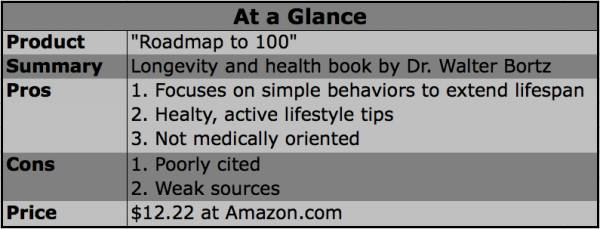
I honestly believe that 99% of what we are capable of doing to extend lifespan can be accomplished with simple behaviors you can begin at any stage of life. I recently read a book that had a similar philosophy, titled The Roadmap to 100.
In the book, Dr. Walter Bortz and co-author Randall Stickrod not only support this theory, but even list out the steps to increased longevity in a way that’s very easy to follow. Not only that, but the authors of the book also explain how our decisions and behaviors govern our individual lifespans. Many people think our genes determine how long we will live, but this book will show you otherwise.
A Refreshing Approach
The book is laid out with a chapter for each longevity-promoting behavior. The chapters detail all the whys behind engaging in activities that keep you living a long and youthful life. The chapters cover the different types of physical activities that support longevity, like cardio, weight lifting, and other forms of exercise you might not expect, like mental exercise and even sex. Another major behavior detailed in the book is how you manage your social connections and why they are important, as well as how you approach your daily tasks like your job.
Another strong point about this book is that although Bortz is a medical doctor he has no illusions about the purpose of medicine. Your doctor is there to manage disease, not necessarily to make you healthier. Entrusting your doctor with your health, as Bortz himself admits, is a big mistake. This is a refreshing, honest, and true opinion.
Some Good Ideas, But Shaky Science
The unfortunate downside of a book like this stems from the nature of studying human longevity. People live a long time, and the science to help us get there is impossible to do very well. So we need to mix common sense with what science we do have. While the authors attempt to take this approach, in some places they fall flat on their faces when it comes to the science.
As an example, in the nutrition portion, the authors advocate low red meat consumption. This seems to be a popular prescription, but little more. Since I am a science-minded and meticulous person, I decided to look at the citations to find out what backed this idea.
To find the science behind the red meat recommendation, I flipped through the book’s shallow reference section for the relevant chapter and found the exact reference. It was not actually a scientific citation, but a reference to an article written about a piece of scientific research. The BBC article cited in the book discusses a study in which red or processed meat was deemed bad for your health. Apparently the study indicated red meat would damage longevity, but even the BBC article contained no citation and merely discussed the study.
The study in question actually sounds similar to a study I reported on that was the same size – a half million people – and had the same goal – to find out if meat was unhealthy. The conclusion of that study, which I reiterated in my article, was that only processed meat was bad for health and longevity, and red meat was neutral from a health perspective.
Since a large chunk of the nutrition chapter was based on what I determined to be shoddy reference material and poor reasoning, I can’t help but wonder how much of the rest of the book is the same. If I had the time I’d research this more, but due to the formatting of the book and references doing so seems untenable.
My Recommendation on This Book
All in all, despite the book’s weaknesses in the nutrition department, most of the advice seems to be sound. When it comes to exercise, eating for general health, and maintaining low body fat, most experts agree on the nuts and bolts, which you will find in this book. I’m not sure it’s the best treatment on the subject, but it may still be good for those readers who are critical thinkers.
The Roadmap to 100 is available for $12.22 at Amazon.com.






